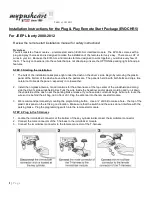
To provide proper protection, a child
seat should meet three
requirements:
Look for FMVSS
213 or CMVSS 213 on the box.
Before purchasing a child seat, or
using a previously purchased one, we
recommend that you test the seat to
make sure it fits properly in the
passenger’s seat.
After selecting a proper child seat,
there are three main steps in
installing a child seat:
All child seats must be
secured to the vehicle with the lap
part of a lap/shoulder belt. A child
whose seat is not properly secured
to the vehicle can be endangered
in a crash.
After installing a child
seat, push and pull the seat
forward and from side-to-side to
verify that it is secure.
A child seat secured with a seat
belt should be installed as firmly
as possible. However, it does not
need to be ‘‘rock solid.’’ Some side-
to-side movement can be expected
and should not reduce the child
seat’s effectiveness.
If the child seat is not secure, use
a different style of child seat that
can be firmly secured.
Make sure the child is properly
strapped in the child seat
according to the child seat maker’s
instructions. A child who is not
properly secured in a child seat
can be seriously injured in a crash.
The following pages provide
guidelines on how to properly install
a forward-facing child seat.
Selecting a Child Seat
Installing a Child Seat
The child seat should meet U.S. or
Canadian Motor Vehicle Saf ety
Standard 213.
The child seat should be of the
proper type and size to f it the child.
The child seat should f it the
passenger’s seat.
Properly secure the child seat to
the vehicle.
Make sure the child seat is f irmly
secured.
Secure the child in the child seat.
1.
2.
3.
1.
2.
3.
Selecting a Child Seat, Installing a Child Seat
34
Main Menu
Table of Contents
Summary of Contents for 2007 S2000 SECURITY SYSTEM
Page 85: ...Main Menu...
Page 123: ...Main Menu...
Page 135: ...Main Menu...
Page 175: ...Main Menu...
Page 201: ...Main Menu...
















































